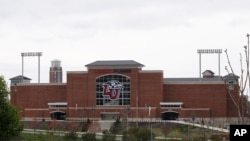The president of an evangelical university in Virginia said Wednesday that arrest warrants had been issued for two U.S. journalists who reported critically on his decision to reopen parts of the campus.
The warrants accuse New York Times freelance photographer Julia Rendleman and ProPublica reporter Alec MacGillis with misdemeanor trespassing on the campus of Liberty University, one of the world's largest evangelical Christian universities, while working on separate stories.
Liberty University President Jerry Falwell Jr. was criticized about his decision to encourage students to return to the university's Lynchburg, Virginia, campus after spring break during the coronavirus crisis. Most other U.S. colleges and universities had ordered students not to return to campus.
Falwell, one of President Donald Trump's earliest and most ardent high-profile supporters, has generally characterized concerns about the virus as overblown.
He has accused the news media of stoking fear and suggested coverage was politically motivated to hurt the president, The Associated Press reported.
Articles by the Times and ProPublica included quotes from professors or students who suggested that social-distancing guidelines to stem the spread of the virus were not practiced satisfactorily on campus.
It was unclear if the warrants can be enforced. The Raw Story, a U.S. online tabloid that published copies of them, reported that the warrants did not appear to have been signed by a judge.
The university did not respond to VOA's request for comment.
In an interview with conservative radio host Todd Starnes, Falwell confirmed the warrants had been issued and said the Times article was "materially false."
The Times reported that nearly one dozen on-campus students had symptoms of the coronavirus, attributing the information to Dr. Thomas W. Eppes Jr., "the physician who runs Liberty's student health service."
The Times reported that Eppes said three students had been tested for COVID-19 and that at least one off-campus student had tested positive.
"We've lost the ability to corral this thing," Eppes said he told Falwell, according to the Times report.
Falwell told Starnes that Eppes has "no official role at Liberty" and "immediately issued a correction" on his comments to the Times. He added that the comments from the doctor "were completely false."
Eppes was not cited in the ProPublica report, which interviewed students and employees.
Falwell also defended his decision to allow students back on campus, estimating that "maybe" less than 10% of the school's on-campus residential units were occupied.
The university president said during the interview with Starnes that people witnessed both alleged incidents of trespassing. He said signs prohibiting everyone except students, faculty, staff or people with official business from entering the campus had been placed at all entrances.
New York Times spokeswoman Eileen Murphy told VOA in a statement that its "freelance photographer was engaged in the most routine form of newsgathering: taking a picture of a person who was interviewed for a news story."
"We are disappointed that Liberty University would decide to make that into a criminal case and go after a freelance journalist because its officials were unhappy with press coverage of the university's decision to convene classes in the midst of the pandemic," the Times statement said.
ProPublica President Richard Tofel said in an interview with VOA that the publication had received "no indication at all from Liberty about anything inaccurate or incorrect" in its report. "I've seen the reports, but we've not heard in any way from Liberty or from any Virginia authorities," Tofel said.
In response to the arrest warrants, Tofel said, "If this were the norm it would be extremely troubling. It's unlike anything I've ever heard of."
The Raw Story reported that an examination of the warrants showed the law enforcement officer who signed them was under the authority of the university.
Although the warrants cite the Lynchburg courthouse, no judge seems to have signed them, a judge's name apparently does not appear on them, nor do the warrants appear to be certified by the clerk they were submitted to, The Raw Story reported.
Under Virginia law, the charge in the warrants, which is a Class 1 misdemeanor, is punishable upon conviction by up to a year in jail, a fine of up to $2,500, or both.








